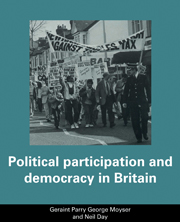Book contents
- Frontmatter
- Contents
- List of figures
- List of charts and maps
- List of tables
- Preface
- Part I Theories and methods
- Part II Patterns and pathways
- Part III Issues and actions
- 11 Agendas and political action
- 12 Do participants get what they want? The costs and benefits of participation
- 13 Learning from political participation
- Part IV The local process
- Part V Conclusions
- Appendix A Survey methods
- Appendix B Measuring elite-citizen concurrence
- Appendix C The National Questionnaire
- Endnotes
- Bibliography
- Index
13 - Learning from political participation
Published online by Cambridge University Press: 03 May 2011
- Frontmatter
- Contents
- List of figures
- List of charts and maps
- List of tables
- Preface
- Part I Theories and methods
- Part II Patterns and pathways
- Part III Issues and actions
- 11 Agendas and political action
- 12 Do participants get what they want? The costs and benefits of participation
- 13 Learning from political participation
- Part IV The local process
- Part V Conclusions
- Appendix A Survey methods
- Appendix B Measuring elite-citizen concurrence
- Appendix C The National Questionnaire
- Endnotes
- Bibliography
- Index
Summary
One of the great themes of participatory democracy has been the claim that citizen involvement in politics has an educative effect on the participant. The idea that participation forms part of a process of political and moral development in the individual citizen may be traced back to Aristotle, but its modern expression is usually taken to be found in Rousseau and John Stuart Mill (Pateman 1970; Parry 1972). According to Rousseau, in the civil state, man's faculties are stimulated and developed, his ideas extended, his feelings ennobled and his whole soul uplifted. He also acquires moral liberty, which ‘alone makes him truly master of himself’. Liberty consists in following rules one prescribes to oneself and only by participating with others as a full citizen in the making of laws could a person achieve civil liberty (Rousseau 1973:195).
For Rousseau this implied a form of direct democracy on the model of classical Greece. John Stuart Mill sought more extended citizen involvement within a political framework of representative government. He saw such involvement as an aspect of a more general objective of the development of individual character (Halliday 1968). Such character was formed in the process of managing one's own manner of life. Social and political institutions should be so arranged as to maximise the individual's opportunities to determine the conditions under which he or she lived. For Mill this meant extending participatory opportunities in local, decentralised government and through industrial democracy as well as through national democratic forms.
- Type
- Chapter
- Information
- Political Participation and Democracy in Britain , pp. 286 - 296Publisher: Cambridge University PressPrint publication year: 1992



